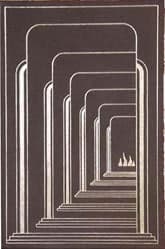The Bonfire of the Vanities
Critique • Quotes • At the movies
 First edition
First editionFirst publication
First draft 1984–1985, Rolling Stone magazine
First book publication
1987
Literature form
Novel
Genres
Literary
Writing language
English
Author's country
United States
Length
Approx. 267,000 words
Filling the cavities
So many people, whose opinions I otherwise value, have told me how incredibly impressed they were by The Bonfire of the Vanities that I wonder what I'm missing, as I have only a middling appreciation for Tom Wolfe's first novel.
I can tell you though what the book is missing: A heart.
I know that's corny and simplistic. What does "heart" mean anyway? Sentimentality? A happy ending? Inspirational passages?
The Bonfire of the Vanities is certainly one of the cleverest novels you'll ever read.
Not clever in its plot—it is somewhat simple compared to your average legal thriller these days. A rich, white guy and his mistress take a couple of wrong turns in his car and end up running down a black kid in a poor neighbourhood. Actually the woman was driving but various forces—including the police, district attorney's office, mayor, newspapers and community activists—work to catch and convict the guy for the allegedly hate-motivated crime, mainly because he is rich and white.
The cleverness is in how the various worlds within New York are depicted through the eyes of these characters and how they fit together in the big, messy mosaic: the worlds of high-stakes bonds traders, inhabitants of the projects, toilers in the Bronx court system, tabloid reporters at their hangouts, Park Avenue high society at their parties.
And, this being Tom Wolfe, the cleverness is also in the flashy, overheated, kaleidoscopic presentation of the mental lives of these people. In particular we follow Wall Street wunderkind Sherman McCoy, the rich, white guy who refers to himself internally as a Master of the Universe.
But somehow, despite the endless detail about McCoy's life and despite his thoughts and fears being shared for endless pages, he remains the rich, white guy who is persecuted for a crime he didn't commit although he is guilty of much else. That is, we never really get to know him beyond his role as representing a certain kind of person in New York in the 1980s. This is even more the case for the lesser characters.
I'm not sure why this is so. I'm not sure why some other writers can tell you almost nothing about a character and yet the character takes root in your consciousness, becomes flesh and blood. While Wolfe can tell you so much and yet the character remains bloodless.
Certainly there are in Bonfire many episodes that reveal characters' foibles and hidden strengths. Perhaps this is done too calculatedly. Perhaps we're too dazzled by the surface spectacle to go beyond that level. I don't know what indefinable quality is missing but, whatever it is, let's call it heart.
Profound reaction
So I don't care for any of the characters. I don't care about any of the characters because I accept they are just pieces being manipulated by Wolfe to make his cynical points.
And those points being?
Everyone is out for himself or herself.
People are grasping swine.
Calls for justice and equality are covers for cash grabs or power grabs.
And we shouldn't take any of it very seriously. Just sit back and be entertained.
This is a deeply reactionary book.
Near the end of Bonfire, Wolfe, writing from the point of view of all-seeing author for a change, discusses a belief of certain native peoples that individual minds do not exist, that the community fills the cavity in each person. It's an interesting, even profound idea.
Wolfe takes it as his creed, though in the least profound manner possible. By his lights, in The Bonfire of the Vanities, the most superficial matters of social status, wealth and manners are poured into each character to define him. People are naught but the parts given them to play and the costumes provided them to wear.
— Eric
Critique • Quotes • At the movies

